Insects, rhodents, and other pests can cause havoc in a birdroom.
Rather than using sprays, poisons and baits here are a few effective natural remedies you may like to try to help protect your birds.
Ants:
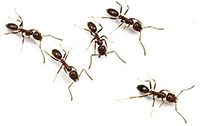
Cinnamon
Cinnamon is an effective ant repellent. Its smell discourages ants from entering any area.
Add ¼ to ½ teaspoon of cinnamon essential oil in a cup of water. Soak a
cotton ball in this solution and wipe down the areas where ants may enter
and dwell. Repeat once daily until all the ants are gone.
You can also put ground cinnamon and whole cloves near entry points.
White Vinegar
White vinegar will also send an eviction notice to ants on your premises. They cannot bear its strong smell. In addition, the smell masks their scent trails, making them lose their direction.
Mix equal parts of white vinegar and water.
Pour the solution into a spray bottle.
Add a few drops of any essential oil and shake the bottle thoroughly.
Spray this solution around baseboards and other entry points.
Lemon
To make your birdroom ant-proof, try lemon. The smell deters ants and its
acidic property masks their scent trails.
Rub some lemon juice on door thresholds, windowsills and other possible
areas where ants are getting in.
Scatter small slices of lemon peel around outdoor entrances.
Peppermint
Peppermint is a natural insect repellant that can effectively keep ants away. Ants hate its strong smell, which also disrupts their smelling capabilities so they cannot detect food sources.
Add 10 drops of peppermint essential oil to 1 cup of water. Spray the
solution on all areas where ants are present. Repeat twice daily, until the
ants are gone completely.
Sprinkle some dried peppermint around your doors, entryways and garbage
areas to repel ants.
You can even grow peppermint plants in birdroom.
Food-Grade Diatomaceous Earth
Food-grade diatomaceous earth (DE) also works well as an ant repellent.
The microscopic razor sharp edges of DE can cut through the ants’ exoskeletons, gradually causing their body to dry out.
Gently sprinkle a thin layer of DE on windowsills, beneath the fridge, under
cabinets, in and around garbage cans and any other places where you see
ants.
Repeat once daily until all the ants are gone.
Note:
Do not wet the DE or it will not work.
Flies:
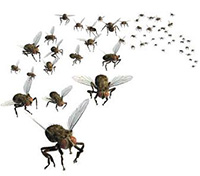
Plant Basil
The scent put off by the basil plant is enough to completely repel flies. They cannot stand the strong odor and will not go near any area that is surrounded by the scent. Planting basil will repel flies and provide a fresh herb to add to the veges you feed to the birds.
Bay Leaves
The odor of bay leaves, whether it is fresh or dried, is enough to repel flies. Leaving the leaves whole will actively repel any flies in the area, but if the bay leaves are ground into a powder, the scent of the bay leaves will become stronger therefore acting as a stronger repelling agent.
Catnip
The strong scent of catnip will make flies go crazy. flies detest it. In a 2006 study it was shown that catnip provides up to 95% protection against stable flies and up to 75% protection against house flies. Catnip discourages the flies from laying their eggs when used in high concentrations.
Clove
Clove is an old favourite when it comes to repelling flies. The aromatic odor is pleasant to us, but flies will not be able to bear the scent. When used alongside fresh lemons, you will create a super powered fly repellent.
Fodder Mites & Moths:
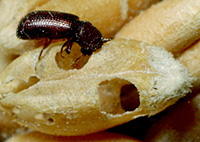
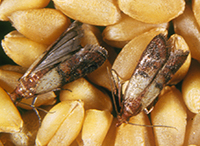
Food-Grade Diatomaceous Earth
Food-grade diatomaceous earth (DE) added to your seed storage bin when you mix your seed will eliminate fodder mites and moths.
Grain Weevils:
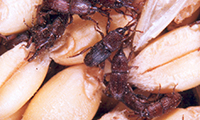
Food-Grade Diatomaceous Earth
Food-grade diatomaceous earth (DE) added to your seed storage bin when you mix your seed will eliminate grain weevils.
Mice:
Peppermint Oil
Peppermint oil is an effective mouse deterrent.
Rodents have a heightened sense of smell and mint smells especially noxious to mice. If the scent is strong enough, it will deter them from making your home theirs.
Put 20-3o drops of this oil on cotton balls and leave them in corners, or entry holes. Replace when the smell of peppermint fades away.
You can use mint leaves or mint toothpaste if you don't have the oil.
Cloves
Like the mint plant, cloves are naturally pungent to prevent them being eaten by animals in the wild. Mice and many other household pests do not like the smell and will avoid it.
To use cloves to get rid of mice and stop them entering the birdroom, you can crush some whole cloves and place near entry points. Or you can use clove oil in wet cotton balls to be placed in the same areas.
Instant Potatoes
Instant potatoes have to be one of the most unusual home remedies to get rid of mice. How can laying down food possibly keep mice away?
The reason is that instant potatoes, although perfectly edible when hydrated, are very dangerous to mice when dehydrated.
The starchy flakes absorb water in the gut and expand. The rapid expansion of food in the gut is what kills the mice. Using instant potatoes is one of the most natural ways to get rid of mice.
Place them in the corners and places where mice visit frequently.
Bay Leaves
Bay leaves certainly has to be the most natural remedy to get rid of mice. Bay leaves are a good option to deter these pests, as these do not harm anyone. Mice will avoid crushed bay leaves.
Dryer Sheets
The chemicals in dryer sheets are noxious to mice. Mice hate the smell of dryer sheets and they can be used to repel mice wherever they are laid.
Mites:
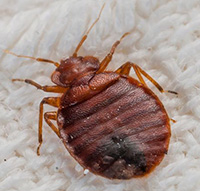
Garlic Juice
To prevent against red mites and feather mites add garlic juice to the drinking water for one week 3-4 times each year.
Diatomaceus earth and Garlic Powder
When pairing up put a spoonful of diatomaceus earth and garlic powder in the concave of each nestbox along with wood shavings. As the hen cleans the nest she will scatter to powder into all the nooks and crannies providing protection against mites.
Mosquitoes:
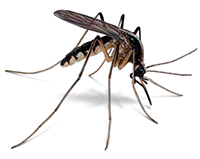
Coffee Grounds
This is a really simple, yet effective method for getting rid of mosquitoes. Just sprinkle coffee grounds wherever you find still water near your home. The mosquito eggs present in the water will be forced to the surface and will be deprived of oxygen. This will kill them before they are hatched and prevent mosquitoes from breeding.
Camphor
This is another home remedy to get rid of mosquitoes in an environmentally friendly way. All you do is close all the doors and windows in a room, and then light the camphor and leave it alone for about a half hour. When you back to that room, the mosquitoes will be gone.
Basil
If you plant basil in your garden and put a few potted basil plants around your birdroom, mosquitoes won't come near you.
Roaches:
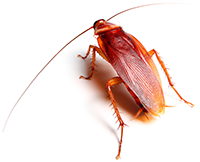
Cedar oil
Many essential oils have insecticide properties and can be used to combat roaches.
Cedar oil is one of these natural insecticides. It is effective against all insects and arthropods.
When the roaches come into contact with cedar oil, they suffer from osmotic dehydration and suffocate.
The oil also emulsifies the insect’s body fats and kills them.
Dip cotton balls in cedarwood essential oil and place them where cockroaches are generally found.
Repeated use of cedarwood essential oil will drive roaches away. Cedar balls and blocks can also be used.
Peppermint Oil
Peppermint oil mixed with vinegar aids is one of the best natural ways to get rid of cockroaches. Wipe all your surfaces with peppermint oil.
You can also add few drops of peppermint oil to 1 part of white vinegar and two parts of water and mix well and pour it into a spray bottle.
Spray in places where you find cockroaches.
Neem oil
Neem is famously known for its effectiveness in treating various health conditions but its role as anti-cockroach is less known.
The oil contains an active compound called azadirachtin which is deadly to nearly all insects.
The azadirachtin found in neem oil destabilizes the insect’s hormonal systems. Exposure to neem oil can impede the roaches’ ability to reproduce.
It is a great cockroach home remedy.
Mix equal amounts of neem oil and water. Spray this solution where roaches thrive. Regular cleaning using neem oil is also highly effective.
Bay Leaves
Bay leaves, a common kitchen ingredient, will repel cockroaches.
One of the best non-violent methods, using bay leaves also involves very little exercise in your fight against roaches.
Place bay leaves where you may find cockroaches often, such as on kitchen tops and near appliances. Burning bay leaf can provide added protection.
Lemon
Lemon helps humans in many ways. It works both internally and externally, And a great smelling natural remedy to kill cockroaches too.
If you want to know how to get rid of cockroaches in kitchen, you should use lemon juice to clean. Clean all the surfaces with lemon juice. You can also add water to lemon juice and mop the floor.
Pepper, Garlic, And Onion
The smell of these three suffocates roaches.
Grind onion and garlic and add pepper powder to the ground paste. Add water and bring to boil. Pour it in a spray bottle after the liquid cools.
Sprinkle in areas that are cockroach-prone. You can also add cayenne pepper to the solution before boiling.
Cucumber
..... is an effective cockroach repellent and extremely safe as well. Roaches are not fond of cucumber smell and can be used to deter the insects.
Slice cucumber and place the pieces where you find roach traffic.
Pandan Leaves
A common cooking ingredient in Asian countries, pandan leaves also plays a role in driving cockroaches away.
It is a natural roach repellent as they find the smell of the leaf to be intolerable.
Place pandan leaves in places you find roaches. Replace the leaves with fresh ones frequently.
Catnip
Place some catnip around your home. You can also boil catnip and pour the extract in a spray bottle for easy use.
Diatomaceous Earth
Diatomaceous Earth, also referred to as DE, is non-toxic and an effective way to rid roaches.
It attacks the exoskeletons of the roaches and absorbs fats and oils from outer layer thereby dehydrating them.
Slugs & Snails:

Spreading Broken Eggshells/Nutshells
Sharp and edgy shells of eggs and nuts are a great remedy for slugs. Since these crawling creatures find it hard to move over sharp surfaces to reach your plants and fruits, you will soon find them leaving your garden. Crushed eggshells also provide a boost of calcium to the soil making it more fertile.
Sprinkling
Diatomaceous Earth around your lawn and near the plants is helpful in keeping slugs and snails away. Also known as insect dust, it works in the same way as the eggshells. Being sharp, it damages the slug’s body deterring them naturally.Salt
Salt is dangerous for slugs as it dehydrates their body and kills them easily. Sprinkling salt directly over their body can make them die within minutes.
Garlic
Garlic is one of the best home remedies for deterring slugs and snails from your garden. It does not cause any damage to the soil or plants and is a sure shot way to keep slugs away.
Add some crushed garlic to boiling water and let it steep for a few hours. When it cools, strain the solution and fill it in a spray bottle. You may spray this directly on the slugs and plants around which they are found.
Seaweed
The salt content in seaweed can be toxic to the snails and will deter them effectively. You may use both fresh and powdered seaweed to spread or sprinkle in your entire garden.
Slug Repelling Plants
Nature provides us excellent remedies in its own unique ways. Just like other insects, slugs are repelled by certain species of plants in a natural way, and we can simply take advantage of it.
Growing plants like fennel, rosemary, thyme, parsley, garlic, ginger, alliums, sage, and wormwood is great for checking slugs around your garden.
Spiders:
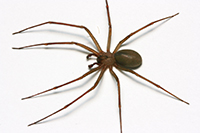
Vinegar Spray
Take one cup of white vinegar in a spray bottle and mix it with two cups of water.
Now spray this mixture around your house at the spider entry points, like the window, doors, ventilation, etc
Tea Tree Oil
You can get rid of spiders by using tea tree oil too. Mix tea tree oil with white vinegar and spray it in areas where you find spiders.
The aroma of tea tree oil is something spiders totally hate.
Lavender Oil
Just like tea tree oil, lavender oil is a good spider repellent. You can sprinkle a dash of lavender oil in the spider dominated areas.
Also, to avoid spiders from entering your house, just fill a flower vase with a little bit of water and add 5 drops of lavender oil to it. Now, keep the fresh flowers in it.
The aroma of lavender oil stops the spiders to make their way to your house.
Peppermint Oil
Peppermint oil can also be used to ward off spiders. Be it non-venomous spiders or the venomous ones, the strong smell of peppermint oil will keep them under check.
This oil is a natural insecticide.
Garlic Spray
Mix garlic juice in a spray bottle filled with water. All you need is 10 cloves of garlic to extract juice out of it.
Now spray this mix in the corners of your house to repulse spiders.
Black Pepper
Black pepper is also an effective remedy to get rid of spider mites. The spicy black pepper can be finely ground to make a powder. Use this powder to spray on spiders and other insects.
Note – Black pepper spray is a spicy insect repellent. Try to keep it out of the reach of children. Cover your mouth and wear glasses while spraying it, as it tends to irritate the skin and eyes.
Lemon
Citrus smell is something spiders hate. The smell of lemon stops spiders from crawling around happily. Mix lemon with water and use it as a spider repellent spray.
You can also use lemon-flavored hand wash, liquid soap, floor cleaner, etc., to avoid the entry of spider in the home. Dry the lemon peels in sun, and grind them to make a powder. Now spray this powder at the required areas to make spider-free.
Orange
Just like lemon, you can use orange peel powder to drive spiders out from your home and garden.
Limonene present in citrus fruits has insect repellent properties.
Turmeric
Tumeric is a great natural insect killer and can help you get rid of an array of pests.
Spiders are allergic to turmeric, so you can sprinkle turmeric powder to drive out the spiders
Baking Soda
Baking soda is biopesticide.
Sprinkle baking soda in the corners of your birdroom and other places which are dominated by the spiders.
Salt
Salt is actually poisonous to spiders. This is also a safe, natural ingredient which you can use in your house to get rid of spiders. Mix salt with water to make an effective anti-spider spray and sprinkle it to hound out the spiders.
Cloves
Use cloves to keep spiders away from home. You can either mix clove with water to make a spray, or can simply put a few cloves in the webs of spiders.
Eugenol present in cloves is used as an insecticide to get rid of many insects like spiders, fleas, etc.
